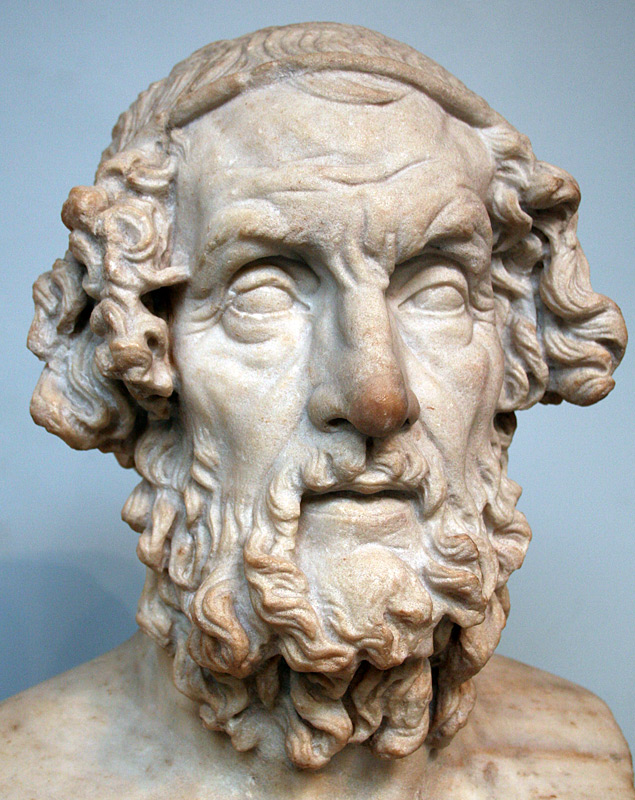Homérosz híres idézetei
Homérosz: Idézetek angolul
“We two have secret signs,
known to us both but hidden from the world.”
XXIII. 109–110 (tr. Robert Fagles).
Odyssey (c. 725 BC)
“I'll fling a spear myself and leave the rest to Zeus.”
XVII. 515 (tr. Robert Fagles).
Iliad (c. 750 BC)
“See now, how men lay blame upon us gods for what is after all nothing but their own folly.”
I. 32–34 (tr. Samuel Butler).
Odyssey (c. 725 BC)
“Who, on his own,
has ever really known who gave him life?”
I. 216 (tr. Robert Fagles).
Odyssey (c. 725 BC)
“He in the turning dust lay
mightily in his might, his horsemanship all forgotten.”
XVI. 775–776 (tr. R. Lattimore).
Iliad (c. 750 BC)
“He will tell you no lies, for he is an excellent person.”
III. 328 (tr. Samuel Butler).
Odyssey (c. 725 BC)
“The proof of battle is action, proof of words, debate.”
XVI. 630 (tr. Robert Fagles).
Iliad (c. 750 BC)
“The fleeting shadows of the dead.”
X. 521 (tr. G. A. Schomberg).
Odyssey (c. 725 BC)
“The gods don't hand out all their gifts at once,
not build and brains and flowing speech to all.”
VIII. 167–168 (tr. Robert Fagles).
Odyssey (c. 725 BC)
“If indeed there be a god in heaven.”
XVII. 484 (tr. S. H. Butcher and Andrew Lang).
Odyssey (c. 725 BC)
“Bird-signs!
Fight for your country—that is the best, the only omen!”
XII. 243 (tr. Robert Fagles).
Iliad (c. 750 BC)
“Hardship can age a person overnight.”
XIX. 360 (tr. Robert Fagles).
Odyssey (c. 725 BC)
“It's light work for the gods who rule the skies
to exalt a mortal man or bring him low.”
XVI. 211–212 (tr. Robert Fagles).
Odyssey (c. 725 BC)
“There she encountered Sleep, the brother of Death.”
XIV. 231 (tr. R. Lattimore).
Iliad (c. 750 BC)
Δοιαὶ γάρ τε πύλαι ἀμενηνῶν εἰσὶν ὀνείρων·
αἱ μὲν γὰρ κεράεσσι τετεύχαται, αἱ δ' ἐλέφαντι.
οἵ ῥ' ἐλεφαίρονται, ἔπε' ἀκράαντα φέροντες·
οἳ δὲ διὰ ξεστῶν κεράων ἔλθωσι θύραζε,
οἵ ῥ' ἔτυμα κραίνουσι, βροτῶν ὅτε κέν τις ἴδηται.
XIX. 563–568 (tr. Robert Fagles); spoken by Penelope.
Odyssey (c. 725 BC)
“The blessed gods have no love for crime.
They honor justice, honor the decent acts of men.”
XIV. 83–84 (tr. Robert Fagles).
Odyssey (c. 725 BC)
“The recklessness of their own ways destroyed them all.”
I. 7 (tr. Robert Fagles).
Odyssey (c. 725 BC)
“A deep sleep took hold upon him and eased the burden of his sorrows.”
XXIII. 343–344 (tr. Samuel Butler).
Odyssey (c. 725 BC)
“When a Man's exhausted, wine will build his strength.”
VI. 261 (tr. Robert Fagles).
Iliad (c. 750 BC)
“Friends, we're hardly strangers at meeting danger.”
XII. 209 (tr. Robert Fagles).
Odyssey (c. 725 BC)
